( #Blogaday 05/365 )
This is the third blog in the series
of crochet tiny doll-like furniture I’ve made for a huge order recently. As I mentioned in the past two days’ blogs,
if you liked what you read, then do follow me either via Facebook or this blog
so that all future blogs/patterns come straight to your inbox. Part of what is shown in the photograph above has already been shared in my last two blog posts.
My first furniture set is here ; this is the 2nd set ; this is the 3rd set ; here is the 4th set ; and here is the 5th set. Here is a cute Christmas tree. Today I’ve used some of our lovely Indian
Oswal 4-ply yarn with a 3 mm
crochet hook.
Thank you for joining me. In case you have just joined me, know that you can access all of my earlier creations by checking under ‘categories’ on the right hand side of this blog under “Labels”.
How labels work : All patterns under a similar label can be found together so when you click on the label for say "crochet baby dress pattern", all my baby dress patterns are available - so scroll down to the very bottom and click on "Older Posts" to move onto the next post in the series. Before you reach that you have several other ways to find my blogs including blog links at the bottom of this blog
For your convenience, follow me here or on Facebook, You Tube, Pinterest, Twitter or Instagram.
Oh, and may I add that the fastest way to find any of my blogs is via Pinterest and if you are looking for more children wear then come here
All my blogs can be printed. Find the print friendly (green) link on the right of this blog. You can also hit Control P (or Command P for Mac) on your keyboard, and the blog will go directly to the connected printer.
Remember that you only print if absolutely essential. Save paper – Save Our Earth.
Do remember to add my blog URL when you make and show off your creation. Just copy the link on the search bar above - that's the blog URL.
To purchase this or similar yarn online, click the highlighted links below to buy your yarns online via Amazon (India). While you will still pay the same, I may get paid by Amazon as well.
This is a free blog - so do pay it forward for me. Cheers.
General yarn info : The yarn used today is not specific to this pattern.
You can use any yarn with a suitable hook to make this project to any size.
International yarns : Among the international yarns I have used in this thickness, I’d suggest Aunt Lydia Cotton 10, Aunt Lydia Bamboo-Viscose 10, DMC Petra, Sullivans knitting cotton (Australia), Milford Soft, Hilaza Rustica Eclat , Alize cotton yarn and Alize bamboo yarn , Lily Sugar n' Cream cotton yarn, Caron Simply Soft , Bernat Softee chunky. Skill level : Intermediate to Advanced skill level
Abbreviations used :
ch : chain ch-sp : chain space
sp : space rep : Repeat
fsc : Foundation single crochet
dc : Double crochet
Single Crochet : Sc : yo, insert hk into st ; yo (2 lps on hk); yo, draw through both lps. One sc made. Check out the video at
https://youtu.be/ghACqBpA-3k Instructions using U.S terminology
Please note that I start all my rows with a ch 1, turning chain for ease.
Please check the top of this blog for easy video tutorials on all stitches used in today's pattern. For your convenience there video tutorials through the blog too
Please read through all my notes before you pick up your hook, so you know just where we're heading in our pattern.
In my patterns I work with the principle of stitch count and body measurement.
This means that you need to work the stitch count in pattern, till you get the measurement (length and/or width) that you need for your project.
In this blog , we’ll once again look at
chairs and a futon.
My friend has a really large picture bay window
along one of her living room walls, and stretched right across that window is a
futon. As I am trying to recreate her
living room with tiny furniture, the futon needed to be made too
Oh by the way, did you catch my blog on the Xmas tree (one green and one snowy white)? Well, those trees were also for this friend, and the idea was that that's what she can see from her large picture bay window.
1.
YET ANOTHER CHAIR
In yesterday’s blog, I shared patterns for three chairs that I've made,
and here’s another one that I found. For this project, here's the free pattern
link here
However, once I started to make this, I found it
way too large for my tiny little (other) furniture, so I have not used it for my
lovely furniture montage. That said, I
thought I should add this link here, as it’s a really good pattern. I have not added this sofa set to my montage,
and sadly I did not manage to complete my product before this set of furniture
was sent off – so I just leave you with the inspiration made by the designer. Photo below is not mine but that of the designer shown here to inspire you.
2.
RECTANGULAR FUTON
Right under a really wonderfully large picture
glass window, my friend has positioned a large rectangular futon (I think
that’s what it is from the photographs her husband had sent me) – so here’s how
I went about making that rectangle.
Information for the rug shown here has been shared in yesterday's blog.
Size : 1.5” tall ;
1.5” wide ; 5” across
Single Crochet : Sc : yo, insert hk into st ; yo (2 lps on hk); yo, draw through both lps. One sc made. Check out the video at
https://youtu.be/ghACqBpA-3k
So depending on how wide/tall you want your
rectangle, you need to cut out a piece of cardboard. So for my futon, I folded the cardboard 1.5”
x 4 times + 0.5” = 6.5” x 5” piece.
I
then marked 1.5” and folded it at the marked points and the last 0.5” is to
join it to the start cut to make a rectangle.
Stick together to make the shape needed.
Size : 1” tall ;
1.5” wide ; 5” across
For this piece, I simply worked a fsc chain for the length of the cardboard rectangle I'd made.
I then worked sc in each fsc all the way to the end for the width of the cardboard rectangle.
When I had the width, I worked in the back loop just to get an edge, and then turned to work the 2nd side. Continue this till you have all four sides. This makes up the length and width of the cardboard rectangle.
Join the last side also in back loops to finish off the rectangle.
For a neat edge, I re-attached the yarn at one corner (where you have worked sc blo) and worked sl-st all the way in the blo all the way till the end. That gives it a neat edge. Work this on all four edges and this gives it a neat rectangular finish.
For the two ends, re-attach your yarn at any one corner, and work sc along the length of one side. Turn and continue to work sc back and forth till you have the width of that opening done. Finally attach the other three sides with an embroidery needle or with an sc-join
Just before you join off the last side, I stuffed a little bit of poly fill between the box and the yarn on one side, which will be the top of your futon, and give it a nice cushioned effect. Ta da.. one futon done!
For stuffing : I use stocking net balls to stuff my toys and amigurumi. To make a stocking net ball, wrap a bit of stuffing in a piece of stocking net and then the top of the net. The stuffing not only stays inside the ball and does not creep out of the gaps in our stitching, but also adds to preventing allergies. Use similar colored stocking net as your yarn if you can - to keep colors from showing through. For our project today, make thin long balls.
Thus us what my stocking net ball looks like
3.
ROUND BOLSTER – 1
In my first blog on cute little toy furniture,
I’ve given patterns for little cushions.
For the rectangular futon, I thought a set of
bolsters would look perfect. Here’s what
I did for that.
Read through the pattern first, and then decide
if you’re doing it in one color or two, and the pattern thereof.
Size : 2”
long x 0.5” diameter
Half Double Crochet : Hdc : yo, insert hk into st ; yo (3 lps on hk) ;
yo, draw through all 3 lps. One hdc made.
Chainless start for Half Double Crochet : I dislike the ch-2 start, and this is what I do to start my row of hdc. Check out the video at
https://youtu.be/lWXpl1KdbZ8
Start :
with
a magic circle and 11 hdc in that circle.
Join with a sl-st to the 1st
st.
Work the circle with as many stitches as you
want for the circumference of your bolster.
IF you are going to work the Spike Stitch pattern, then you need to work
in multiples of 4 + 3 for this start round.
Round 1 : sc-blo
in the 1st hdc and in each hdc all around. Join with a sl-st to the 1st st.
This forms the rim of your bolster on one end.
From the following round, I have chosen not to
join with a sl-st and work in continuous rounds. This is just so that I don’t get a join
line.
So to keep count (not that it is
that important anyway, may I suggest you keep a marker along the last st, and
move it along each time). If you are
unable to keep count, go ahead and join with a sl-st.
Rounds 2 - 8 : sc
in the 1st sc and in each sc all around.
Partly stuff your bolster. We will finish stuffing it just before you
work your final round.
Round 9 : sc-blo
in the 1st sc and in each sc all around. Join with a sl-st to the 1st st.
Notes for pattern and 2-color use :
If you’re using 2 colours, as I have, then what I’ve done is work the sc-blo
round in the 2nd colour. I’ve
then worked 3 rows in plain sc all around, and in the following row, I’ve
worked the Spike Stitch.
The Spike stitch is a series of long and short stitches used together to get
the wavy pattern.
How to work the Spike Stitch :
We use the single crochet and the elongated single crochet stitch working in 2
– 3 rows below. In case the video does not come on, please visit https://youtu.be/HOmg3TlBF64
In our case, we will work 2 rows of sc first,
and then work the Spike stitch along Round 3.
*Work a sc in the 1st st ; an
e-sc in the next st in the row below ;
a dc in the
next st in the row 2 rows below ; an e-sc in the next st in the row
below* . You will repeat this array *to*,
such that 1st sc in the row you’re working on, next sc in the row
below, and the 3rd sc in the row 2 below and then the 4th
one will be in the row below again to get the wave effect. Got it?
So working the Spike stitch in a second colour
gives you a neat pattern and just right for this tiny project.
Finishing for both the single coloured as well
as the 2-coloured bolster are the same.
In our final round, we will work a set of hdc
3-tog and hdc 2-tog to close up our bolster.
Half double crochet 2-tog : hdc 2-tog : [yo, insert hk in st or ch-sp, yo and pull up a lp] (3 lps on hk) ; insert hk in st or ch-sp, yo and pull up a lp (4 lps on hk) ; yo, draw through all 4 lps on hk. One hdc 2-tog made.
Round 10 : hdc
2-tog over in the 1st 2 sc ;
(hdc 3-tog over the next 3 sc) ;
rep
(to) all around.
Join with a sl-st to
the 1st st.
Fasten off leaving a tail.
Pass the tail through the last few stitches
and pull to close.
Finish off the end
neatly and push the tail inside the bolster.
Glue all ends neatly.
Ta da.. your neat bolster is done!
7A. ROUND BOLSTER - 1
Size : 2” long x 0.5” diameterFor the 2nd bolster, I’ve worked the
same way as before, but for the pattern, instead of the Spike Stitch, I’ve just
decided to work an alternate colour every other round.
Start and ending rounds are exactly the same for
both bolsters.
Enjoyed this ?? I sure did.. come back right here for more freebie patterns.
Do remember that this is the first blog of many for living room doll furniture, so if you’ve liked this experience, add your email id to the blog or follow me so you can get all the other bits of furniture too.
If you're visiting me here for the first time, and have liked the experience, do add me to your mailing list (for your convenience) , and all my future free patterns will come straight to your mail box.
I’d appreciate if you could credit my blog (and link the original pattern link) when you make your own creation. Thanks.
Have a great day and see you soon.
I have a few other miscellaneous crochet stuff
I’ve already made, and just in case you want a dekho at those free patterns
… here you go



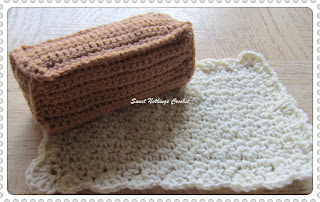


















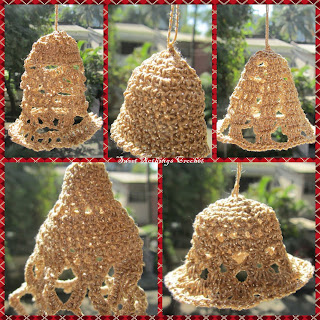

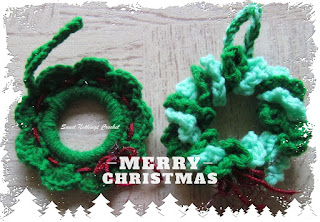
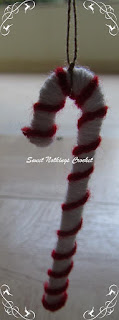



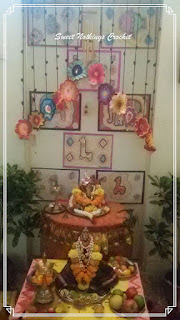



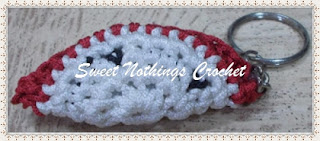



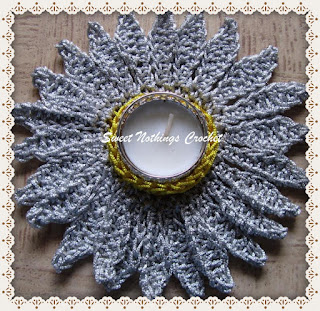
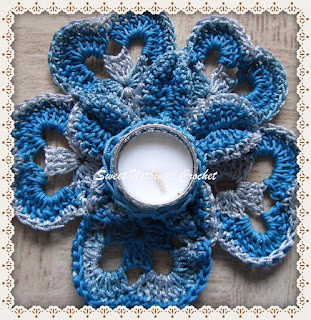






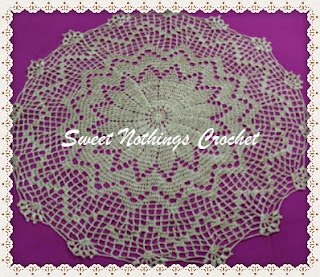

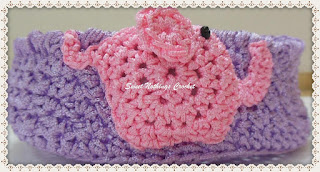






No comments:
Post a Comment
Thanks for taking the time to stop by. Do tell me what you think. Cheers